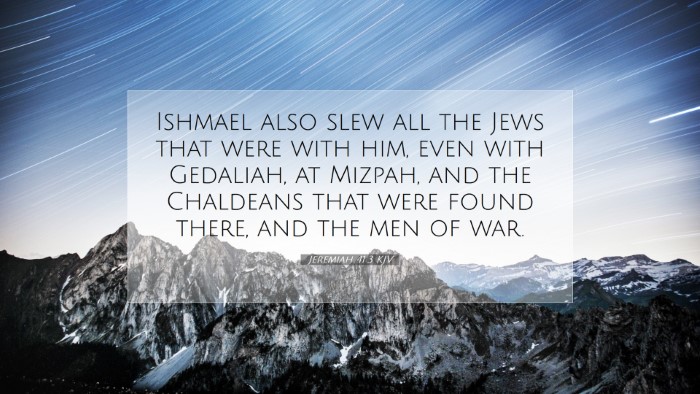Commentary on Jeremiah 41:3
Jeremiah 41:3 states, "And Ishmael the son of Nethaniah slew them, and cast them into the midst of the pit, that he hath made: and the men that were slain were about eighty men." This verse captures a pivotal moment in post-exilic Judah, showcasing the political turbulence following the Babylonian conquest. Below, we will explore various insights drawn from public domain commentaries, emphasizing the theological and historical implications of this scripture.
Historical Context
The events described in this chapter occur shortly after the fall of Jerusalem. Ishmael, a member of the royal family and an ally of the Ammonites, is depicted as committing a gruesome act of murder against those who were left in the city. Understanding this backdrop is crucial: it reveals the desperation and chaos that characterized the Jewish community in the wake of exile and destruction.
Insights from Matthew Henry
Matthew Henry emphasizes the wickedness of Ishmael’s actions, highlighting the brutal reality of assassinations in that era. He notes how Ishmael’s treachery was not merely an act of violent ambition; it represented the fragmentation of hope among the people. Henry elaborates:
- Deception and Treachery: Ishmael deceives the remaining leaders under the pretense of friendship, leading to betrayal— a poignant reminder of the human heart's propensity for evil.
- Judgment and Consequences: This act serves as a divine judgment upon Judah for their persistent disobedience. Henry draws parallels with the history of Israel, noting that such betrayals have often stemmed from a lack of faithfulness to God.
Perspectives from Albert Barnes
Albert Barnes provides a succinct analysis of the implications of Ishmael's actions for both the immediate community and the broader theological narrative. His commentary reflects on the nature of leadership during upheaval:
- The Illusory Safety: Barnes points out the false sense of security that the people had after the fall of Babylon. They were naive to think that peace could be attained through alliances with external forces like the Ammonites.
- Symbol of Destruction: The act of throwing the slain into a pit symbolizes the complete disregard for life and the normalization of violence. It becomes a metaphor for the spiritual decay within the society.
Adam Clarke's Commentary
Adam Clarke takes a more descriptive approach, delving into the ethnic and cultural implications of the violence. He focuses on Ishmael's identity and motivations:
- Ishmael’s Ancestry: Clarke highlights that Ishmael was a descendant of the royal lineage, bringing to light the notion that those in power are often prone to the very desires that lead to ruin. His actions stemmed from a desire to reclaim authority and validation.
- Spiritual Implications: Clarke argues that this massacre is a manifestation of the larger narrative of abandonment by God. The sinful actions cannot be separated from the long-standing idolatry that plagued Israel leading to divine judgment.
Theological Reflection
This verse is rich with theological implications. The violent act committed by Ishmael exposes the fragility of humanity post-exile. Why does God allow such chaos among His people? This invites deeper reflection on divine sovereignty and human agency:
- The Sovereignty of God: The situation illustrates a world that, although in turmoil, is still under the watchful eye of God. It raises questions about God's presence amidst suffering.
- The Role of Prophets: Jeremiah, as a prophet, had long warned against such disobedience. Ishmael's violence serves as a stark reminder of the consequences of ignoring prophetic warnings.
Conclusion
In closing, Jeremiah 41:3 is more than just a historical account; it is a profound commentary on the condition of the human heart and the social dynamics following a national crisis. It serves as a warning to future generations about the dangers of betrayal and the consequences of turning away from God. As pastors, students, theologians, and scholars explore this passage, it remains essential to connect this historical moment with the timeless truths of scripture, reminding communities of faith of God’s enduring presence through times of trial.


